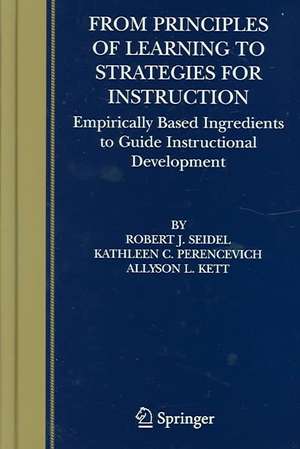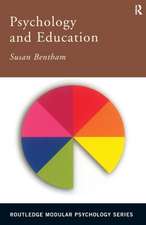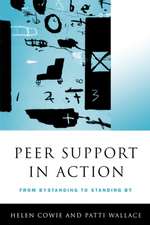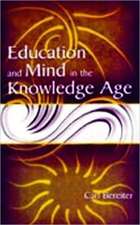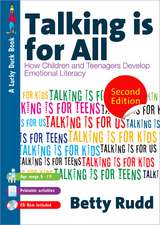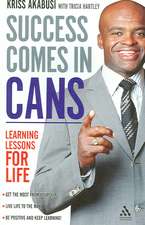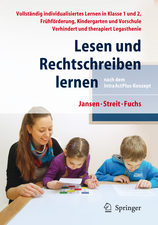From Principles of Learning to Strategies for Instruction: Empirically Based Ingredients to Guide Instructional Development
Autor Robert J. Seidel, Kathleen C. Perencevich, Allyson L. Ketten Limba Engleză Hardback – 9 noi 2004
| Toate formatele și edițiile | Preț | Express |
|---|---|---|
| Paperback (1) | 639.73 lei 6-8 săpt. | |
| Springer Us – 29 oct 2010 | 639.73 lei 6-8 săpt. | |
| Hardback (1) | 645.79 lei 6-8 săpt. | |
| Springer Us – 9 noi 2004 | 645.79 lei 6-8 săpt. |
Preț: 645.79 lei
Preț vechi: 759.76 lei
-15% Nou
Puncte Express: 969
Preț estimativ în valută:
123.59€ • 128.55$ • 102.03£
123.59€ • 128.55$ • 102.03£
Carte tipărită la comandă
Livrare economică 14-28 aprilie
Preluare comenzi: 021 569.72.76
Specificații
ISBN-13: 9780387234762
ISBN-10: 0387234764
Pagini: 230
Ilustrații: XXVI, 230 p.
Dimensiuni: 170 x 244 x 21 mm
Greutate: 0.57 kg
Ediția:2005
Editura: Springer Us
Colecția Springer
Locul publicării:New York, NY, United States
ISBN-10: 0387234764
Pagini: 230
Ilustrații: XXVI, 230 p.
Dimensiuni: 170 x 244 x 21 mm
Greutate: 0.57 kg
Ediția:2005
Editura: Springer Us
Colecția Springer
Locul publicării:New York, NY, United States
Public țintă
ResearchCuprins
Heuristics and Taxonomy.- A Cognitive Domain Example: Reading.- Psychomotor Domain.- Affective Domain.- Interpersonal Domain.- Suggestions for the Integration of Technology.- Summary.
Notă biografică
Currently, Dr. Robert J. Seidel is Research Chief Emeritus at the Army Research Institute. He attained his Ph.D. in Experimental Psychology from the University of Pennsylvania and was a NIH Special Postdoctoral Fellow at Stanford University. He has taught full- time at Denison University, and part-time at, George Washington University, the University of Maryland, and Trinity College in Connecticut. He has a varied and rich experience base spanning over 36 years of research, development, and management in the areas of experimental design, individualized instruction, computer-administered instruction, technology transfer, distance learning, and evaluation. In these areas of expertise, he has given many talks, nationally and internationally, published numerous articles and seven books. He was principal investigator for a National Science Foundation grant, which resulted in his co-authoring, (with colleagues B. Hunter, C. Kastner, and M. Rubin) Learning Alternatives in U.S. Education: Where student and computer meet. Dr. Seidel organized, then conducted an educational technology conference, and subsequently edited (with M. Rubin) a book, Computers and Communication, based on the findings from the conference. The next book, Computer Literacy, was edited by Dr. Seidel, R. Anderson, and B. Hunter. He has also managed groups of research personnel in both the private sector and in government, and has served many years as an advisor to NATO for the implementation of advanced technologies. As part of his NATO work, Dr. Seidel served as senior editor and contributed chapters to four books dealing with the use of technology in education and training.
Kathy Cox-Perencevich is finishing up her dissertation towards obtaining her Ph.D. at the University of Maryland in educational psychology, while working full-time as a lead researcher at The National Reading Research Center. She attained a M.S. in educational psychology at the Pennsylvania State University and completedteacher certification programs in elementary education and in special education in Massachusetts. Ms. Cox-Perencevich has been pursuing research related to diagnosing and improving students engagement in literacy development. Her overall focus has been on cognition and motivation in classroom settings. In that regard, she has a number of recent publications in educational psychology journals, and book chapters, dealing with techniques for enhancing motivation and cognitive development in the field of Reading.
Allyson Kett is presently completing her work towards a Psy.D. in Clinical Psychology from the American School of Professional Psychology at Argosy University, Washington D.C., and is a National Consortium Research Fellow at the U.S. Army Research Institute in Arlington, VA. Prior to coming to D.C., she obtained her M.A. in Clinical Psychology with a specialization in Education at Teachers College of Columbia University in New York City and her B.A. in psychology from the College of William and Mary in Williamsburg, Virginia. Ms. Kett has a broad, verse background in developing and delivering instruction in the training and educational fields. She worked at the New York Bankers Association developing educational programs for bankers of all levels. In addition, she has experience working in the educational field, including developing instructional materials for, and assisting in the teaching of, children of all ages who are mentally challenged and/or have developmental disabilities. Ms. Kett also assisted in planning, organizing, and implementing seminars and leadership forums for a national, industry sponsored, college Scholars Program.
Kathy Cox-Perencevich is finishing up her dissertation towards obtaining her Ph.D. at the University of Maryland in educational psychology, while working full-time as a lead researcher at The National Reading Research Center. She attained a M.S. in educational psychology at the Pennsylvania State University and completedteacher certification programs in elementary education and in special education in Massachusetts. Ms. Cox-Perencevich has been pursuing research related to diagnosing and improving students engagement in literacy development. Her overall focus has been on cognition and motivation in classroom settings. In that regard, she has a number of recent publications in educational psychology journals, and book chapters, dealing with techniques for enhancing motivation and cognitive development in the field of Reading.
Allyson Kett is presently completing her work towards a Psy.D. in Clinical Psychology from the American School of Professional Psychology at Argosy University, Washington D.C., and is a National Consortium Research Fellow at the U.S. Army Research Institute in Arlington, VA. Prior to coming to D.C., she obtained her M.A. in Clinical Psychology with a specialization in Education at Teachers College of Columbia University in New York City and her B.A. in psychology from the College of William and Mary in Williamsburg, Virginia. Ms. Kett has a broad, verse background in developing and delivering instruction in the training and educational fields. She worked at the New York Bankers Association developing educational programs for bankers of all levels. In addition, she has experience working in the educational field, including developing instructional materials for, and assisting in the teaching of, children of all ages who are mentally challenged and/or have developmental disabilities. Ms. Kett also assisted in planning, organizing, and implementing seminars and leadership forums for a national, industry sponsored, college Scholars Program.
Textul de pe ultima copertă
The purpose of this volume is to help educators and training developers to improve the quality of their instruction. Unlike other books, which have appeared so far, this volume is not limited to a particular theoretical position. Nor is it like many of the instructional design texts, which ignore the learning literature. Rather, it draws upon any and all of those research-based principles regardless of learning theory, which suggest heuristics to guide instructional strategies. The approach of the authors is unique in that they develop a framework or model taxonomy for tasks, through which the principles of learning can be related to particular learning processes, suggesting distinctive strategies for specific instructional tasks. The authors present a four-stage model that includes Acquisition, Automaticity, Near Term Transfer, and Far Term Transfer.
The book is a practical guide for developing instructional strategies across the four principal domains, cognitive, affective, psychomotor, and interpersonal; and is backed by empirically supported learning principles. It is useful both to the experienced as well as the novice developer (e.g. the student).
"The current volume strikes a nice balance between theory and practice and provides a straightforward model of instruction that is easily connected with relevant research but equally easy to apply to instructional development projects… The detailed treatment of the interpersonal domain and the emphasis on technology integration clearly distinguish the book as a modern treatment of instructional development that goes well beyond traditional instructional system development models… Therefore, this volume should provide a well-grounded and useful tool for instructional developers."
From the Preface by Michael Spector, Florida State University.
"This book represents a major milestone in the literature on learning because it brings togetherresearch from the fields of psychology, education, and the training in a format which is highly useful to practitioners. It will be very valuable to teachers, trainers, students, and researchers alike."
Greg Kearsley, University of Wisconsin, Madison and, UMUC, University of Maryland.
The book is a practical guide for developing instructional strategies across the four principal domains, cognitive, affective, psychomotor, and interpersonal; and is backed by empirically supported learning principles. It is useful both to the experienced as well as the novice developer (e.g. the student).
"The current volume strikes a nice balance between theory and practice and provides a straightforward model of instruction that is easily connected with relevant research but equally easy to apply to instructional development projects… The detailed treatment of the interpersonal domain and the emphasis on technology integration clearly distinguish the book as a modern treatment of instructional development that goes well beyond traditional instructional system development models… Therefore, this volume should provide a well-grounded and useful tool for instructional developers."
From the Preface by Michael Spector, Florida State University.
"This book represents a major milestone in the literature on learning because it brings togetherresearch from the fields of psychology, education, and the training in a format which is highly useful to practitioners. It will be very valuable to teachers, trainers, students, and researchers alike."
Greg Kearsley, University of Wisconsin, Madison and, UMUC, University of Maryland.
Caracteristici
A practical guide for developing instructional strategies across the four principal domains, cognitive, affective, psychomotor, and interpersonal Backed by empirically supported learning principles Includes supplementary material: sn.pub/extras
